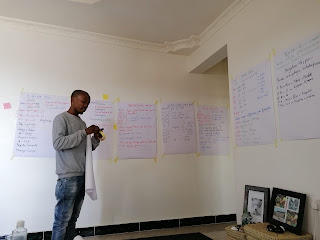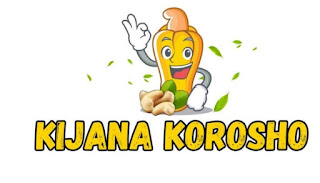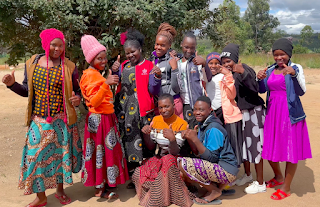Simba
/ENGLISH VERSION BELOW/
Dès mon arrivée à Iringa, j’ai très vite compris que je ne pourrais pas compter sur l’anglais pour communiquer avec la population locale. En effet, la majorité parle uniquement Swahili et acheter deux avocats au marché est déjà un joli challenge quand on ne maitrise ni les prix, ni la langue. Je me suis donc fixée comme objectif d’être capable de comprendre et d’avoir des conversations de bases en Swahili d’ici la fin de mon séjour. Ceci m’aide et m’aidera également dans mes projets, car tout se joue dans les interactions directes. Depuis 10 jours, je prends donc des cours de Swahili avec Andrew, un professeur privé que j’ai engagé pour 20h intensives sur deux semaines. Je jongle donc entre le Swahili et mes projets et ai déjà de bonnes bases de grammaire. Une fois mes cours terminé, je me mettrai au vocabulaire.
L’avantage, c’est que toutes les personnes que je côtoient apprécient mes efforts et s’improvisent professeurs à leur tour, chacun amenant quelques mots comme contribution. A la fin de chaque journée, je m’endors donc avec du nouveau vocabulaire et progresse aussi vite que je peux.
Culture générale : le Swahili est une langue qui tire ses racines principalement des langues arabes, mais on y trouve aussi des mots d’espagnol comme « meza » (table) et bien évidemment des mots en anglais. Langue officielle du Kenya, de l’Ouganda, du Rwanda, de la Tanzanie, des îles Comores et de la république démocratique du Congo, elle est parlée par environ 150 millions de personnes. Les mots sont faciles à lire et à prononcer pour une personne francophone et la grammaire est très logique, ce qui rend l’apprentissage plus facile.
Quelques mots qui sonnent bien..
- kuku : poulet
- kaka : frère
- mbu : moustique
- mtoto : enfant
- mambo : salut
- kijiji : village
- simba : lion
- tempo : éléphant
- kiki kiti ka : au milieu de
- hakuna matata / hakuna shida : il n’y pas de problème
- salama : bien




.jpeg)
Comments
Post a Comment